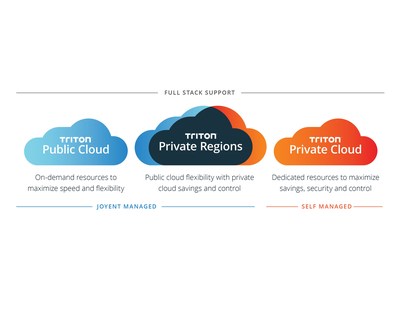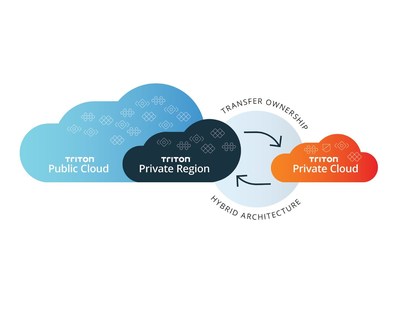
SAN FRANCISCO, Sept. 6, 2017 /PRNewswire/ -- Joyent, the open cloud infrastructure as a service leader, today announced Triton Private Regions, a next generation approach to cloud infrastructure as a service that combines the best of public and private clouds to deliver increased control and dramatic cost savings. The new market offering — built on the foundation of Joyent's modern and open Triton Public Cloud — is expected to change the competitive landscape by filling a growing market need for an innovative alternative that addresses the limitations of current public and private cloud solutions.
Triton Private Regions uniquely combine private cloud economics and control with the simplicity of a public cloud by creating dedicated, private regions for a customer that are extensions of Joyent's modern and open Triton Public Cloud. This enables organizations to reclaim control and ownership of their cloud data and gives them the ability to precisely calibrate the performance and security of their infrastructure. Companies can exploit this increased level of control and their lower cloud costs to create new sources of market differentiation.
With Triton Private Regions, organizations with large scale and predictable infrastructure requirements, such as cloud storage and accelerated computing, have cut their current cloud costs by 50 percent or more.
"An increasing number of cloud mature organizations are asking for a greenfield approach to address ballooning cloud costs," said Joyent CEO Scott Hammond. "These companies realize that the economics of today's public cloud solutions stopped making sense as they grew their cloud footprints and accumulated large, predictable workloads. Many also want to reclaim ownership of their data while avoiding the growing data transfer costs imposed by Amazon Web Services (AWS)."
Hammond continued: "Over the past year, we've been working with some of the world's largest and most sophisticated cloud users to develop a next generation cloud. The result is Triton Private Regions, a revolutionary leap that is a true game changer for companies eager to find new ways to compete in their markets."
The challenges and limitations of today's public cloud are significant for large scale users: spiraling costs, vendor lock in risks, and the inability to fine tune for differentiation and compliance. Add the fact that companies are moving away from cloud providers they perceive to be competitive to their businesses. Private clouds are not the answer because they are often prohibitively difficult to build and operate, cannot keep pace with public cloud innovation and suffer from a poor user experience.
"Long-term digital business success requires a cloud application strategy that respects the potential need for portable cloud application deployments," said Eric Knipp, Managing Vice President of the Application Platform Strategies (APS) research team at Gartner. "In addition, to achieve resiliency benefits and exploit the lure of differentiated cloud services, solution architects must evaluate strategies for multicloud application deployment." 1
Triton Private Regions provide solution architects a new way to optimize their application architectures. And because Triton Private Regions are built on 100 percent open source technology, they provide customers with the freedom to take complete control of their cloud infrastructure by leveraging Joyent's new cloud business model (Build, Operate and Transfer).
Joyent, the original corporate steward of Node.js, is a long time advocate for portability and open source technology.
"Joyent has helped propel Node.js into the successful and widely adopted development framework that it is today," said Mark Hinkle, executive director of the Node.js Foundation. "Enterprise adoption of open source technologies like Node.js and containers has skyrocketed as serverless, mobile and IoT have become mainstream in the cloud."
A current Joyent customer — formerly one of AWS' biggest customers with hundreds of petabytes of annual cloud data — has seen their cloud costs shrink by more than 50 percent after migrating to Triton Private Regions in the U.S., Europe and Asia. The global manufacturer wanted to rein in their ballooning expenses, mitigate vendor lock in risks and regain control over their cloud infrastructure. The result: hundreds of millions of dollars in annual cost savings and the ability to position themselves for growth with market-differentiating capabilities as one of the world's largest consumer electronics manufacturers.
"We at Joyent hold the apparently controversial view that Jeff Bezos is not going to own and operate every computer on the planet — that there are indisputable economic advantages to owning one's own hardware. That said, there is a clear impedance mismatch today between the service level offered by the modern cloud and the complexity of specifying, procuring and operating hardware," said Bryan Cantrill, Joyent's CTO. "Triton Private Regions are designed to fit in that gap: a 100% open source solution that delivers the economics of hardware and the peace of mind of investment protection with the higher-level services that cloud-native computing demands."
Cantrill continued: "Triton Private Regions aren't for everyone: at smaller levels of scale, one should enjoy the elasticity and flexibility that the public cloud offers. But for those for whom their public cloud bill has exploded from trivial to crippling — a profile that we find fits an increasing number of cloud-native applications — Triton Private Regions offers a new alternative."
To keep up with growing demand, Joyent is investing heavily in growing its global network of data centers. Triton Private Regions have been launched in the United States (Ashburn, Virginia) and Europe (Amsterdam), with additional data centers coming soon in Asia (Singapore, Korea and China).
About Joyent
Joyent, a wholly-owned subsidiary of Samsung, is a provider of modern, open cloud infrastructure as a service. The San Francisco-based company created Triton, a cloud infrastructure solution built with the agility and flexibility to evolve with new architectures and applications while optimizing performance and driving down costs. Large enterprises use Triton to successfully run and scale cloud-based web, mobile and IOT applications at half the costs of other cloud providers. Learn more at www.joyent.com.
1 Gartner, A Guidance Framework for Architecting Portable Cloud and Multicloud Applications, Eric Knipp, Traverse Clayton, Richard Watson, 16 December 2016
For more information, please contact:
Renee Maler
Philosophy PR + Marketing
For Joyent
510.499.9746
[email protected]
SOURCE Joyent



Share this article